
当前位置:
发生在中国海南的扶贫故事:帮助穷人,首先要激发他们的内生动力 - To help the poor, motivate them first: poverty alleviation stories in south China's Hainan
来源:
|
作者:Liu Ning, Sheng Chuyi, Li Yan, Jeffrey Moeller (People's Daily Online)
|
发布时间: 2019-06-11
|
5926 次浏览
|
分享到:
Accelerating the construction of the Free Trade Zone (Port) and promoting the opening-up of China's service industry, Hainan is taking on the important mission of China's comprehensive deepening reform and opening-up with its characteristics and advantages. To accomplish this mission, leading all villages out of poverty is the bottom line.
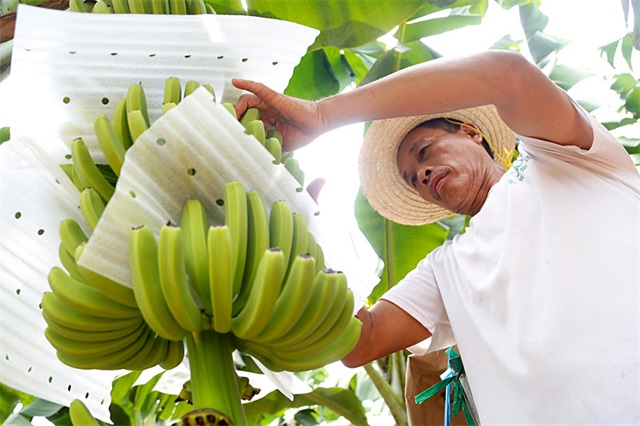
A local farmer picks bananas. (People's Daily Online/Ji Zihui)
According to data from the Hainan Provincial Office of Poverty Alleviation, since 2012, a total of 661,100 rural poor in Hainan have been lifted out of poverty, and the poverty rate has declined from 13.1 percent to just 0.77 percent.
The per capita disposable income of rural residents in poverty-stricken areas is expected to have reached 11,450 yuan last year, up 11 percent year-on-year, with a growth rate of 2.7 percent more than the provincial average.
People's Daily Online traveled to villages in Qiongzhong County, Baoting County, and Lingao County, Hainan Province, to find out what poverty alleviation projects have done so far and whether poor households in the area are actually better off.
Inspire ambition
Huang Haijun lives on the first floor of the village committee office. A bed with a mosquito net, desk and washbasin are slightly cramped in the less than 10 meter-squared room. "I get up at 7:15 am every day, have breakfast at 7:30 am, and work in the village at 8 am," said Huang Haijun, the Party Secretary of Lingmen Village, Wanling Town, Qiongzhong County, central Hainan Province.
"My job is to identify poor households and people in the local area and encourage them to raise sheep and chickens, to explain the government's poverty alleviation to them, help train them in breeding techniques, and identify the house-to-house needs. To put it bluntly, everything in this village is related to me," Huang explained.
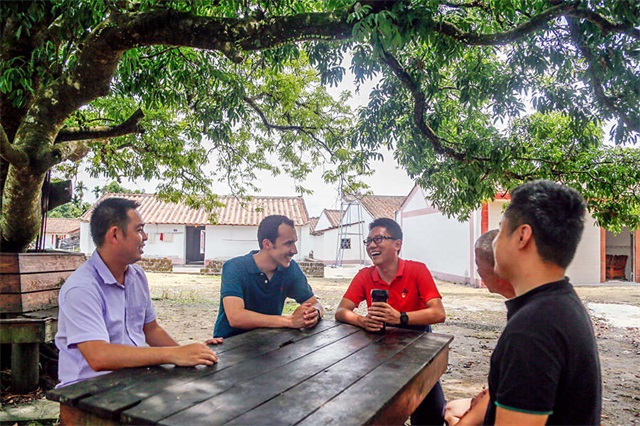
The first time Huang arrived in the village in 2015, he found that quite a few poor households in the village had issues with laziness and gambling. Huang was determined to inspire the ambitions of low-income families.
"They should realize that being poor is not a glorious thing, and the country's policy to help the poor doesn't come for free.
"With the funds and policies from the government, I can help locals to get the most out of their loans. However, the most important thing is to stimulate motivation. Only when they put in their own costs, will they cherish anything. To help the poor, you have to motivate them first."
Huang mentioned Wang Chengan, a then poverty-stricken farmer he helped. "Years ago, Uncle Chengan's house was almost empty. Every time I came to him, he was drinking in his house. His dogs used to bark at me, but now the dog is very familiar with me. Chengan's family has a stable income, and he also pays more attention to his image."
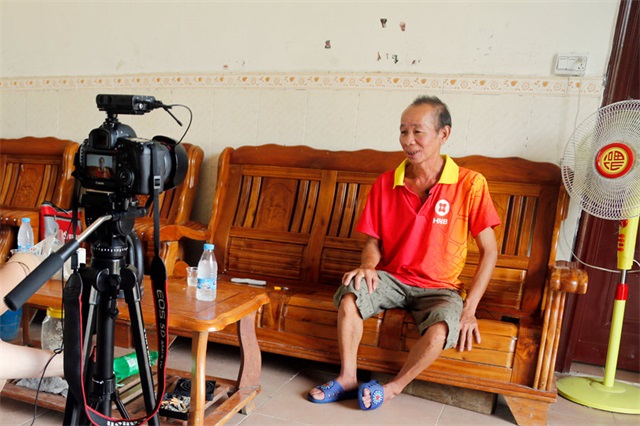
When we visited Wang Chengan, he was watching TV. He made us some tea. He explained that even though he didn't know anything about sheep raising before, he had already learned how to care for them and give his livestock injections.
To help the poor, Huang Haijin cannot see his own family every day. Before we left Lingmen Village, we asked him whether it was worth it. Huang was silent for a few seconds and then said, "I don't want others to be sympathetic to me, because it's all worth it. When I was a child, my education and learned morals told me to put people first. My conscience drives me to help them. Poor households live hard, but our governments have policies and resources, so I can be the bridge to help with just a little effort. When I see these people smile sincerely, I feel that everything is worth it."
Huang Haijun is only one of the over 50,000 party secretaries and local officials in Hainan who have been working hard on the frontline to fight poverty, living and eating with the poor. Thanks to their tireless work, in 2018, Hainan completed its target of bringing 86,000 people, 81 poor villages, and two poverty-stricken counties out of poverty.
Small supermarket boosts motivation
Stepping into the "Poverty Alleviation Supermarket", you can't find cigarettes, wine, high-end products, or even snacks. On offer are only daily necessities, such as cooking oil, salt, soy sauce, vinegar, and tea.
Located in Sangong Village, Sandao Town, Baoting County, Hainan Province, this supermarket offers local farmers donated goods for their everyday life. Local people are not buying them with cash but with credits that they can earn based on their production or efforts in community work.
There is a wide range of ways to earn credits - actively increase production output, focus on personal and family health, clean up rivers and farmlands, participate in TV evening classes and proactively answer questions in the class, to name a few.
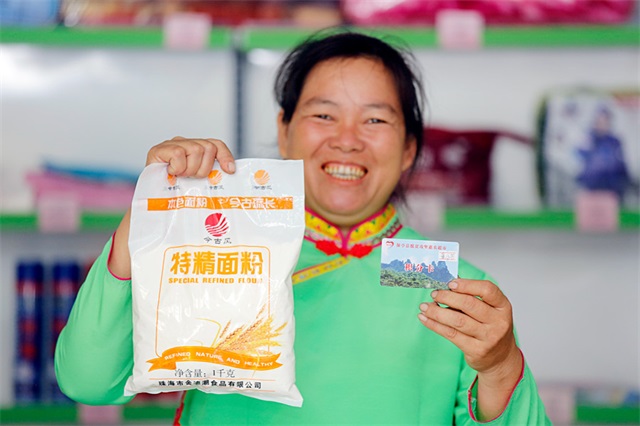
When we arrived at the supermarket, Wang Mei, a woman who left poverty behind at the end of 2018, was buying goods. Wearing a folk costume of the Li ethnic group, Wang was a little embarrassed to talk in front of a camera, so she laughed from time to time. "Almost everything I need at home can be redeemed using credits here. It is convenient and saves money. Everyone gets 50 to 60 credits on average per month, worth about the same amount of RMB goods. Every time I attend an evening class, I can get 3 extra points," Wang Mei told us happily.
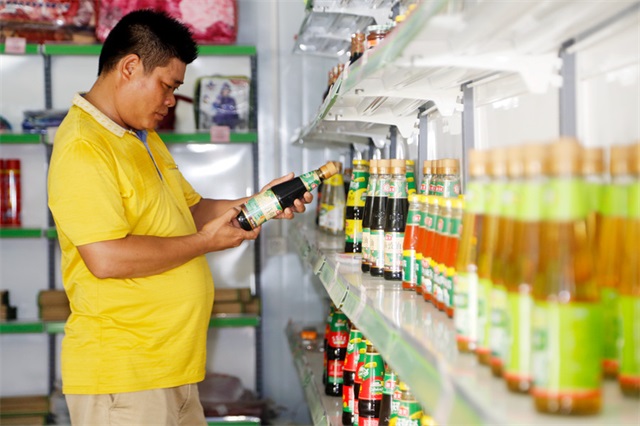
"In the past, companies and individuals who donated supplies to poor households would deliver to their homes. However, in the long term, the poor would become lazy, with a lack of hard work and gratitude. Since we adopted the credits system in the supermarket, everyone is willing to work more to get more points, and actively participate in various community activities in our villages," said Yang Lin, the deputy executive mayor of Sandao Town.
"The majority of the goods here are donated by enterprises. 'Poverty Alleviation Supermarket' is government-led, with business donations, the entire society participates, and the public shares its fruitful outcomes. Everyone actively responds to the policies and together resolves the problem of the insufficient motivation within these poor households. The supermarket played a significant role in our poverty alleviation work," Yang said.
The island's unique industry-oriented efforts
"When I was young, I was penniless, just like those living in poverty today. Life was very hard. I told myself I should study and work hard to change my life," said Xu Yongmei, founder and chairwoman of Hainan Tiandiren Ecological Agriculture, a company which focuses on tropical fruit plantations and crops.
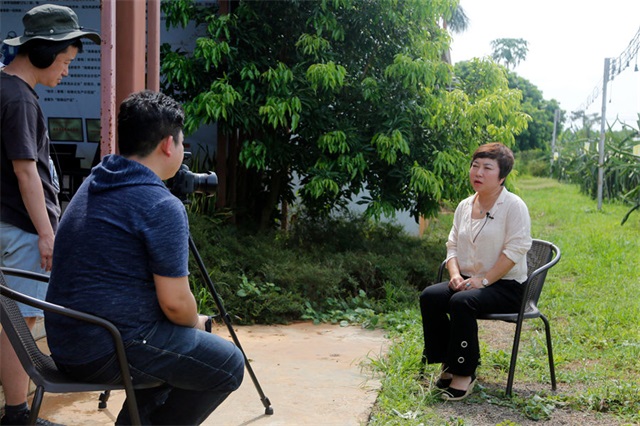
From the initial 50 mu (about 3.3 hectares) to the current 25,000 mu (1,666.7 hectares), Xu Yongmei has deeply integrated her business operations with the needs of local people living in poverty.
We met Xu Yongmei in farmland filled with rippling green dragon fruit leaves in Lingao County, northern Hainan, about 90 kilometers west of Haikou, Hainan's capital. Xu recalled the early days when she started up her business.
"Lingao County, the first place we started from, is a national level poor county. The living situation was left far behind," Xu said.
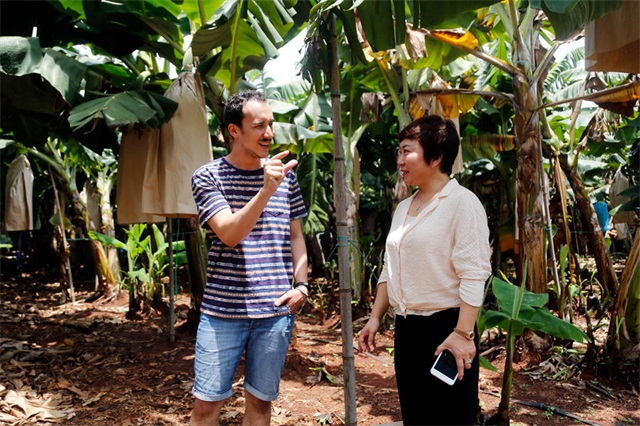
Xu told us that in the past, restricted by traditional thinking, habitual labor practices, and lack of information, poor households only planted out-of-date varieties, using unscientific cultivation methods. "We provide our varieties, technologies, management, and branding to help them move into modern agriculture with us," Xu noted.
"We train them on how to plant and understand the theory. Through education, farmers will know how to run the business by themselves, which is the most important thing for our training," Xu added.
Locals also entrust Xu with their poverty relief funds or their farmland as an investment in her business. In return, they receive bonuses from her business profits. By doing so, Xu has helped lift 3,801 people from 858 households out of poverty so far.
Wang Hai is one of these people. He started working for her company 19 years ago, first heading security. By gradually learning the plantation techniques, he is now in charge of a large banana plantation base spanning 1,000 mu in Lingao County. He bought his own house and car, with a pretty satisfactory yearly income.
"I still remember the first time I went to his house. His whole family was sharing one bed. I told myself I must help them," said Xu Yongmei.
"Nearly 20 years ago, I hardly made 100 yuan a month. I didn't know where to find a job. The company came to our county to develop, so I got the chance to work. I learned how to use the technology and got promoted. My family lives a better life now," said Wang Hai with a thick Hainan accent.
Hainan, utilizing its tropical agricultural resources, has implemented its unique industry-oriented poverty alleviation efforts with great success.
"When everybody works together, including governments, companies and society, we can better accelerate the poverty alleviation process. We should say thank you to the people. When we work together, we make the industry bigger and bigger. From the beginning, it is our responsibility to help them. Gradually, we benefit mutually," said Xu Yongmei.
海南天地人生态农业股份有限公司
海南省海口市龙华区紫荆路2-1号紫荆信息公寓A座25层
电话:0898-68538804 传真:0898-68505016
电子邮箱:tiandirenfarm@163.com

琼公网安备46010502000130号
天地神农 提供技术支持
微信公众号

